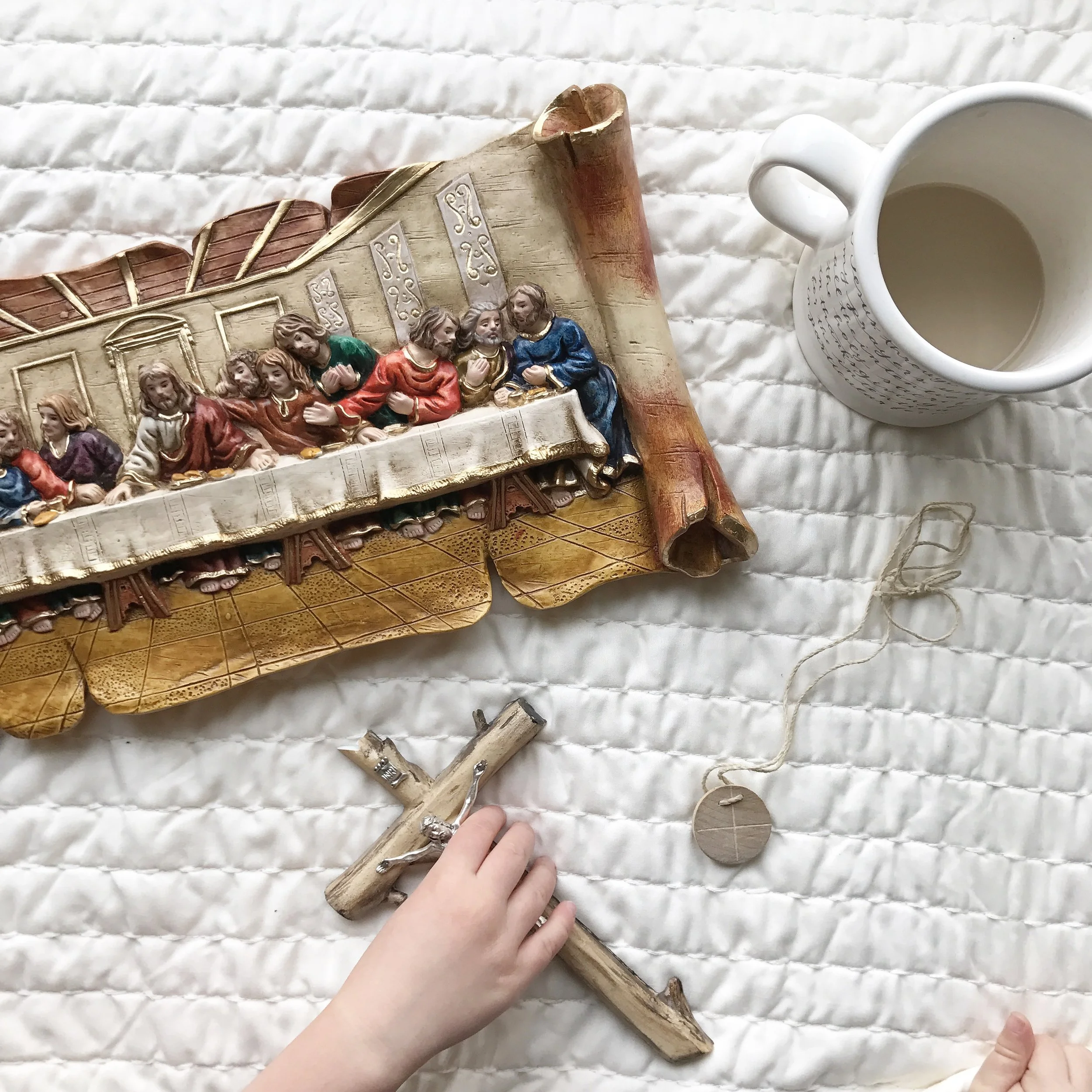On This Good Friday: "I Thirst" (Triduum Series)
As I was reading through one of my copies of The Lord of the Rings during an unexpected naptime, I came across a passage in The Return of the King which alluded so strongly to Christ's crucifixion in such a simple yet profound way.
At the foot of Mount Doom, Frodo says simply, "I'm thirsty, Sam."
Immediately I thought of our blessed Lord on the cross who, after knowing that his work was finished, said, "I thirst."
"At their last halt he sank down and said: 'I'm thirsty, Sam,' and did not speak again. Sam gave him a mouthful of water; only one more mouthful remained. He went without himself; and now as once more the night of Mordor closed over them, through all his thoughts there came the memory of water; and every brook or stream or fount that he had ever seen, under green willow-shades or twinkling in the sun, danced and rippled for his torment behind the blindness of his eyes."
Mount Doom", The Return of the King, JRR Tolkien
"So the soldiers did this. But standing by the cross of Jesus were his mother, and his mother’s sister, Mary the wife of Clopas, and Mary Magdalene. When Jesus saw his mother, and the disciple whom he loved standing near, he said to his mother, “Woman, behold, your son!” Then he said to the disciple, “Behold, your mother!” And from that hour the disciple took her to his own home. After this Jesus, knowing that all was now finished, said (to fulfill the scripture), “I thirst.”A bowl full of vinegar stood there; so they put a sponge full of the vinegar on hyssop and held it to his mouth. When Jesus had received the vinegar, he said, “It is finished”; and he bowed his head and gave up his spirit."
- John 19:25-30 RSVCE
There are several ways we can understand Jesus' words in this passage, and to be honest I had never given it much thought before. The four most common understandings are: he was specifically referring to a physical thirst, a reminder that his nature was both fully God and fully man; it is a reference to a Psalm, perhaps Psalm 69:22 or Psalm 22 (which he also references when he cries out in Matthew 27:46); that Jesus is speaking of a spiritual thirst for the salvation of souls; or that the act of Jesus taking a final drink completes the Last Supper, as it was the "fourth cup" of the Passover Meal. And though all of these understandings seem pretty valid when considered together, the last one really stood out to me as I was reflecting on it.
In Jesus and the Jewish Roots of the Eucharist by Brant Pitre, the author explains a distinct link between Christ's passion and the Passover meal. "By refusing to drink the final Passover cup until his dying moments, Jesus gathers up everything that would happen to him between Holy Thursday and Good Friday—his betrayal, his supper, his agony, his passion, his death—and united it to the Passover that would be celebrated “in memory” of him. As the memorial of his new Passover, the Eucharist therefore not only makes present the actions of Jesus of the Upper Room; it also makes present the sacrifice of Jesus on Calvary."
This connection is further explained by Dr. Scott Hahn in his discussion below.
"It is finished." What is finished? Hahn proposes that Jesus' voluntary sacrifice, which began at the Last Supper and ended after his final drink, is what Jesus is referring to in these last words. After studying the Passover and its significance in the Old Testament, its ties to the Eucharist become clear.
The Passover cedar in the ancient liturgy was celebrated in a four-part structure, reflected in four cups of wine consumed throughout the meal. The first cup begins the festival blessing; the second cup occurs when the Passover story is recounted along with Psalm 113; the main course consisting of roasted lamb and the unleavened bread is followed by the third cup; after the great hymn is sung and the climax of the meal is achieved, the fourth cup is passed. However, in the depiction of the Last Supper in the Gospels, the meal ends without the fourth cup. Jesus explains why he won't drink the fourth cup before He and the apostles proceed to the Mount of Olives.
"And as they were eating, he took bread, and blessed, and broke it, and gave it to them, and said, “Take; this is my body.” And he took a cup, and when he had given thanks he gave it to them, and they all drank of it. And he said to them, “This is my blood of the covenant, which is poured out for many. Truly, I say to you, I shall not drink again of the fruit of the vine until that day when I drink it new in the kingdom of God.” And when they had sung a hymn, they went out to the Mount of Olives." - Mark 14:22-26
(PS notice how that's the first Mass?)
When in the garden of Gethsemane, Christ prays to have this cup removed from him. This is another reason to understand he is referring to the fourth cup of his suffering, the completion of the Passover. "And he said, “Abba, Father, all things are possible to thee; remove this cup from me; yet not what I will, but what thou wilt.” - Mark 14:36
As we recognize the links between the Passover Meal and the Passion of Christ, these passages that I had previously passed by without much thought begin to unfold with so much meaning.
"I thirst" was not something coincidental.
Hahn discusses in this video how difficult it was for a person to breathe, never mind speak, while hanging on a cross. These surely weren't casual words -- besides, did Christ ever do or say anything without a specific purpose? As Christ drank the final and fourth cup, his work had finished.
The institution of the Eucharist, from its beginning at the Last Supper to his final drink on the cross, is the completion of his sacrifice.
In one of his letters, Tolkien wrote of the Eucharist,
“Out of the darkness of my life, so much frustrated, I put before you the one great thing to love on earth: the Blessed Sacrament. . . . There you will find romance, glory, honour, fidelity, and the true way of all your loves on earth, and more than that: Death. By the divine paradox, that which ends life, and demands the surrender of all, and yet by the taste—or foretaste—of which alone can what you seek in your earthly relationships (love, faithfulness, joy) be maintained, or take on that complexion of reality, of eternal endurance, which every man’s heart desires."
Tolkien's profound love for Our Lord is nestled in nearly everything he wrote. And today as we remember Christ's Crucifixion, this simple reflection of Christ in Frodo's "I'm thirsty, Sam" guided me down such a beautiful path to Christ that I couldn't help but share it with you.
I'm praying you have a blessed Good Friday, friends.
May we share in Christ's sorrow as we await the blessed hope of his coming resurrection.
This article has been a part of our three-part series on Triduum 2017.
You can read through the whole series here:







